6-16-19
Margarita Panousopoulou: Acting in a “Moony Comedy”
In This Land Nobody Knew How to Cry
By Diane Sippl
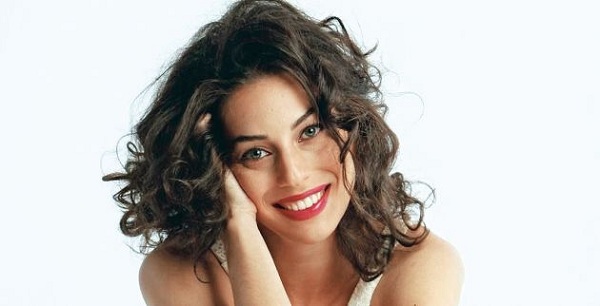
In my favorite entry at the 13th Los Angeles Greek Film Festival, In This Land Nobody Knew How to Cry—part “nutopia,” part Dionysian fantasy, and part romantic comedy—Margarita Panousopoulou plays the leading role as a head-strong economist from Europe who returns to her native Greece. Her mission is to help out the few “survivors” left on the seemingly lost island of Amenaki, whom she feels would be better off relocated to a bigger island. The fact is, this would be convenient for foreign investors who would like to prepare this outpost in the Aegean Sea for development, despite the onslaught of refugees and the threat of a Turkish invasion. However, it’s not long before her character, Avra, at this point an outsider, discovers that the residents have created a life they love, and not only would they never abandon it, but with little effort, they manage to sweep her up in it.
Acting the role under the direction of her long-time writer-filmmaker father, Giorgos Panousopoulos, is part of the discussion which follows, along with thoughts about playing comedy, the evolution of her character, the collaboration of professional and lay actors, and the Greek ritual of the Panigiri.
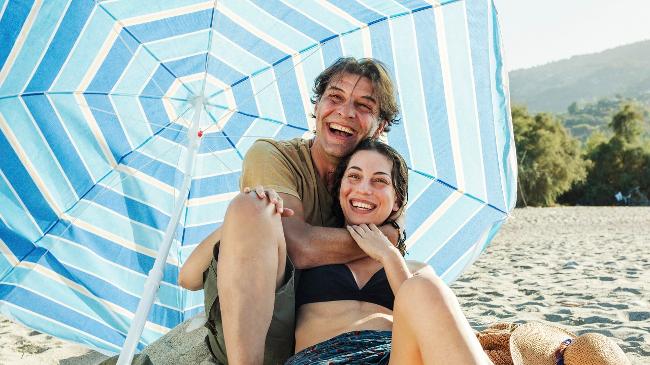
KINOCaviar This was the first time for you to be acting in a film your father directed. Did he imagine the role for you from the beginning, and write it exactly for you to act?
Margarita Panousopoulou To be precise, this was the second time. The first time we worked together on a film was in 1994, and I was a child. I knew there was a child’s part in the script so I asked for a meeting with him (!) in our sitting room, at home. I explained to him the reasons I wanted this part and... I got the job. I vividly remember how seriously I had taken this job and how I handled it with utter devotion and professionalism. To me it was sacred, since I already knew then that I wanted to be an actress. This divine feeling follows me every time I am acting, since I first saw Medea in an ancient Greek theatre at the age of 8.
To answer your question, the role of “Avra” was based on my father’s idea of the perfect woman, as are all his heroines. The thing is, I am certainly not fulfilling the picture of his ideal woman; I am a very different type of woman, and I struggled to find reasons to back up the character’s choices and bring her justice.
KC Did following your father’s directions present any special challenges or advantages?
MP Any challenges rose from the facts of my statement above. There were times when we had very contradictory opinions regarding specific scenes. However, I felt that he was giving me the space I needed. In a way, I felt that he has showing his respect toward me as an actress. Of course, I know how to express myself to directors and communicate my share, but it is also clear to me that once you have chosen to work with someone, that director has the last say. That is how I showed my respect toward my father as a director. Overall, we worked fine together. And of course, no—no special treatment whatsoever.
KC Do you think you understood the role better, growing up with him?
MP No, but it’s a strange thing—the opposite happened. Understanding the role helped me discover certain things about him, the way he sees life and women in particular, and believe me, that was eye-opening. It brought our relationship to a different level.
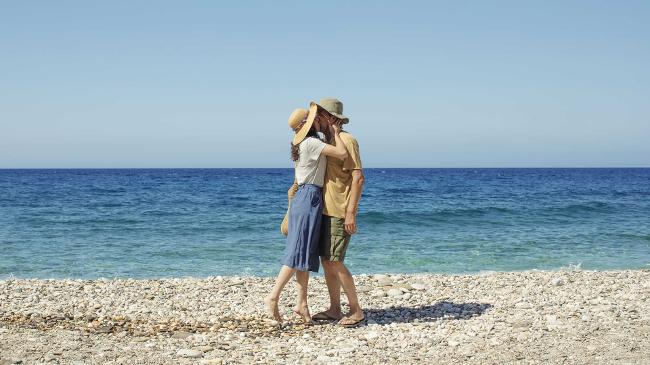
KC You have worked in both theatre and film. Do you usually play comedy roles? How is this role similar to or different from other roles you have played?
MP A few years ago I felt a strong urge to play comedy roles. I felt I was ready to be seen in this way. And I did play comedy. And I enjoyed it. Now, I feel the need to get in touch with different emotions. What I am trying to say is that, for an actor, this is a never-ending process. It changes its shape according to the factors that make you who you are at a specific moment in life. This role was one-of-a-kind and challenging, in the sense that I had to let go of some strongly built ideas I have as a person so that I could truthfully build the character. This is a good thing for us actors, part of our reality. Part of our education. I remember and cherish all those improvisations during drama school in London when I was struggling to get my head around this idea. It was worth it.
KC People say that in playing comedy, timing is everything. Did you find this to be true for you?
MP Of course, but at the same time, timing is nothing if not accompanied by truthful feelings and technique. If those elements are not working in synergy, emptiness makes an appearance on stage.
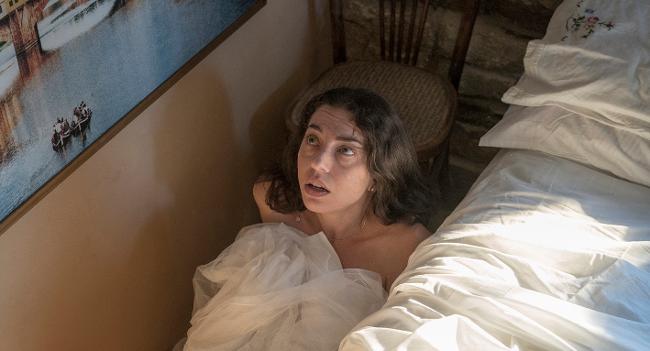
KC I’m thinking of the wonderful scene when you wake up in bed after the big party to find yourself next to the man you have been trying to reject. You roll right out of bed! Was that action your idea? Or was it scripted?
MP It was initially scripted. The mosquito net wrapped around me was improvisational, like many parts of the film.
KC How many times did you shoot that scene (ouch!)?
MP A couple of times. My father is a very experienced cinematographer and knows what he wants when shooting.
KC What about that ironic good-bye kiss you give Vittorio that morning?
MP That kiss came out of an improvisation, if I am not mistaken.
KC Was very much of your acting (or anyone else’s) improvised during the shooting?
MP Yes, a great part of it. It was even mentioned in the script, that many parts are not pre-written because they were meant to be improvised. Besides, purposely the majority of actors participating were amateurs.
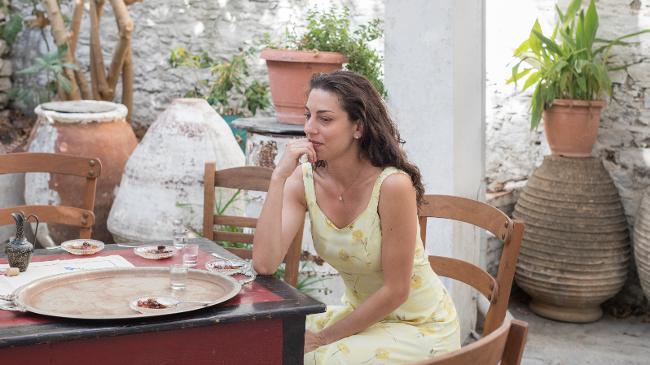
KC You speak and translate several languages in the film—Greek, French, English. Did you know them all already? Was there any special dialect used by the people of Ikaria?
MP I love languages. Being bilingual gains you international social access and makes you intelligible. It also expands the mind and comprehension skills in general, offering you a better understanding of the world. When I was little, I used to think that if a person were able to speak all languages, then he or she would by default become omniscient. I will never stop trying to learn languages, and if I have kids one day, this is the only thing I will be firm about in regard to their education. Yes, Ikaria has a special dialect. I didn’t have to learn it for the role, but other characters required it, so some actors did learn it.
KC Do you have any stories of working with the locals, the lay actors? Did they make your acting easier or more difficult? Did you learn much from them, and they from you?
MP The local actors helped a lot in creating this documentary-like atmosphere. It would be more difficult, I think, to have actors recreating this feeling. Also, it was an amazing experience for them and for us, for sure. The whole island was in this vibration, this groove. It became real. This realistic feeling was the ultimate goal of the film—effortless, natural and truthful from the heart. Also, it’s the essence of authentic Greek films.
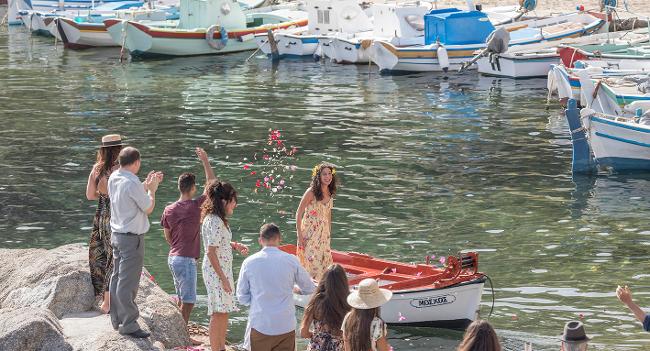
KC Your style of dressing changes as the story evolves, from “professional” to “romantic,” “natural.” Actors sometimes say that costumes can aid their acting. Have you found this to be true?
MP Oh, so true. Sure, in acting it is all about the truthfulness of the actor and sure, we can play acting in skirts and black T-shirts with only a chair as a prop, but let’s face it, an actor is naked without a costume. I hate it when I am asked to use pieces from my personal wardrobe, not out of tightness but because it becomes an obstacle between myself and the character. I was very clear from the beginning in regard to the costumes and hairdos, and the costume designers were totally on board. The costumes had to evolve and change in harmony with Avra’s journey. I remember, for instance, people asking me why I wear my hair straight in the beginning of the film, since it doesn’t suit me as much. I couldn’t care less. The oppressed, neat, and timid side of Avra’s sexuality needed to be exposed. It gives the audience a picture to fit the plot, and it gave me a “partner in crime” to help me access my character and plan her journey, step by step.
KC Your romantic male lead, Vittorio, is very tall and has a very low voice—superficially, he’s the epitome of masculinity. And he almost never stops smiling—he’s a true charmer! Even if your dialogue often overtly challenges him and his ideas of sex roles, we can feel the “chemistry.” What was it like working with him?
MP There is a very fine line between the “on-stage” chemistry and the one in real life. We actors are trained to manipulate it and handle it. The actor who was playing Vittorio is not my type, so there was no underlying erotic chemistry for me to work with. I had to create it from scratch. Of course, Babis Hadjidakis is a brilliant actor, and we worked fluently together.
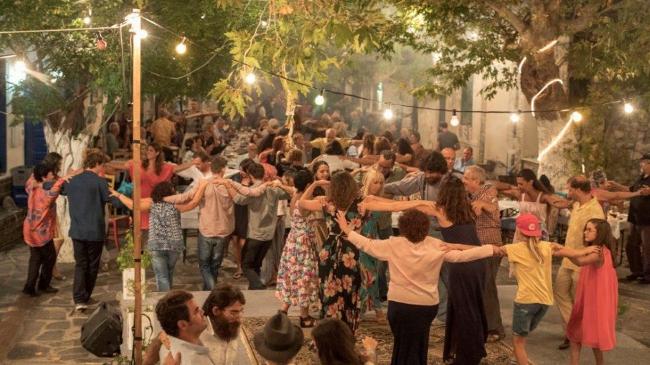
KC What was your favorite scene in the film as an actress? And then looking at the film as a spectator?
MP My favorite scene as an actress was the full-moon fire scene. I entered into a trance stage by dancing for some time to “Anastenarika” (music and songs related to archaic rituals for Dionysus) before shooting the scene. Once in this trance, I didn’t get out of it until we finished the shooting. I was told afterwards that the camera operator was trying to give me some kind of directions, but I swear, I didn’t hear a word. I was somewhere else, and that was the only approach I could bring to the table for this scene. I couldn’t do it any other way. It was an unforgettable experience, and I feel very grateful for it.
As a spectator, I can’t get over the fiesta scene (Panigiri) with all the live Ikarian music and dances. It sets me off, it is mind-blowing—again, with the same pagan flavor, which underlies the whole film.
KC Anything you would like to add?
MP This is a non-political film. It is a moony comedy!
KC Well thank you so much for sharing it with us!
In This Land Nobody Knew How to Cry
Director: Giorgos Panousopoulos; Producer: Eleni Kossyfidou; Screenplay: Giorgos Panousopoulos; Cinematographer: Christos Karamanis gsc; Editor: Nikos Vavouris; Sound: Wreck Ambience, Dario LeBars/Yiannis Skandamis; Art Director: Spyros Laskaris; Visual Artist: Kyveli Zoi Stenou; Costume Design: Mandalena Papadaki.
Cast: Margarita Panousopoulou, Babis Hatzidakis, Fotini Tsakiri, Serge Requet-Barville, Yannis Hajiyannis, Valeria Hristodoulidou, Stavros Mermigis, Elias Gianniris, Kostas Plakas, Petros Hambas.
Color, 90 min., Greek with English subtitles.